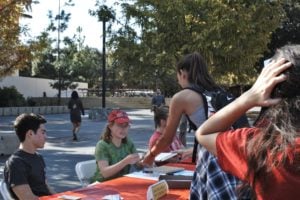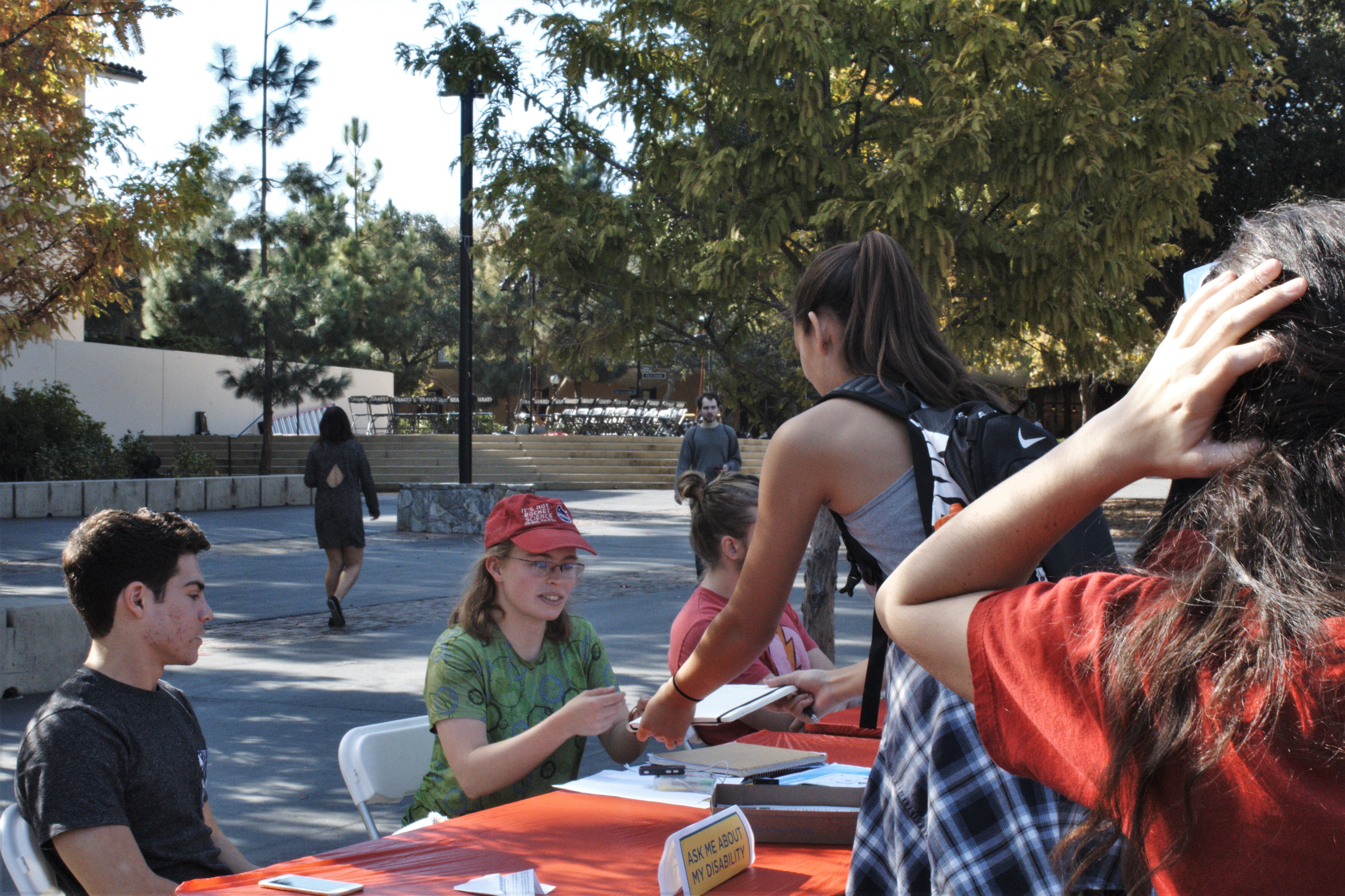Students shared experiences and answered questions about disability and respect at the Associated Students of Stanford University Executive’s “Ask Me About My Disability,” hoping to promote the value of accepting all identities.
Executive cabinet members Zina Jawadi ’18 and Ana Sophia Mifsud ’17 designed the event to celebrate October’s Disability Awareness month alongside the ASSU Disability Awareness team and Power2Act, a disability awareness group on campus.

The event was sponsored by campus resources like the Bridge, Counseling and Psychological Services (CAPS) and the Office of Accessible Education (OAE). It featured 15 tables in White Plaza with representatives covering different perspectives on disability and mental health, as well as a performance by Talisman. An assistive technology company, WHILL, provided examples of assistive technology, including motorized wheelchairs.
The Bridge and CAPS were available to discuss mental health and answer questions about experiences with disability, according to Bridge peer-counselor Rebecca Bromley-Dulfano ’18.
“We’ll be there tabling in case anyone has any questions on mental health or wants to share their experiences with disabilities,” Bromley-Dulfano said.
Jawadi said the goal of the event was to have people approach the tables to discuss topics surrounding disabilities that are not otherwise discussed openly.
“Accessibility leads to universality,” Jawadi said. “We hope this event inspires increased engagement from students with disabilities and their allies.”
Elisa Grave ’17, who attended the event, said that she found the event great for being open about disability.
“This was the first time I was able to really interact with members of the disabled community, and to be so open – it’s not really something you do at Stanford,” Grave said.
Other Stanford students did not have such a positive reaction to the event. Erika Lynn Kreeger ’16 said they found the idea oversimplified and ineffective.
“I want an event that can break through all of their assumptions and build up a powerful and affirming disability politic,” Kreeger said. “This event substitutes that with a simple question and answer on how are disabilities impact our lives. That is not what we need nor what disabled people impacted by the work of Stanford students need.”
Undergraduate senator Gabe Rosen ’19 said that if students are comfortable sharing their experiences, than the event would be helpful in spreading awareness of disability.
“Everybody deals with disabilities a different way,” Rosen said. “Some people don’t want to be defined by their disability, while others want to vocalize that it’s a major part of their identity. People need to recognize that everyone deserves the same respect.”
According to Mifsud, the Disability Awareness team asked potential event participants whether or not they should hold the event, and the team got an overwhelming response of “yes.” She said people wanted to share their experiences and encourage their peers to think about disability.
Mifsud also focused on the importance of respect and identity, saying that she hopes the event helps people to start asking questions and to feel less awkward when discussing disabilities.
“If I am going to accept all identities of this person, I should also consider this identity,” Mifsud said, referring to disability. “I think bridging that gap between thinking of them as your peers but also thinking of them as someone who identifies as having a disability is something that I really hope happens.”
Chris Yoon ’18 hosted a table which allowed students to try on goggles that limited vision. Yoon said he wanted students to have a better understanding of what dealing with disabilities is like.
“It is really hard to put people in your shoes and to build those emotional connections,” Yoon said. “I am glad to have the opportunity to do that here.”
Power2Act also hosted a table encouraging students to get involved with raising disability awareness. Both Jawadi and Mifsud are members of Power2Act and describe the program as a way to make connections between students with and without disabilities.
Power2Act Financial Officer Matthew Ferranti ’16 says he feels like the program has helped members feel as though they are part of a larger community through big sibling programs and internal events, but he is glad that ASSU held this event to bring these internal programs to other students.
“I think Power2Act is really great for students with disabilities to be shown that they can do everything they want,” Ferranti said. “I am glad we have this opportunity to share our program and experience.”
One of the goals of Power2Act is to explore diversity with disability, talking about what makes each individual unique. Jawadi and Mifsud hope that the “Ask Me About My Disability” event also showed the diversity in disability.
“Ability is something that the Stanford community has not grappled with as much as other identities, so in addition to being an attempt to spread awareness on disability, it is a way to make disability a public topic,” Mifsud said.
Contact Gillian Brassil at gbrassil ‘at’ stanford.edu.
